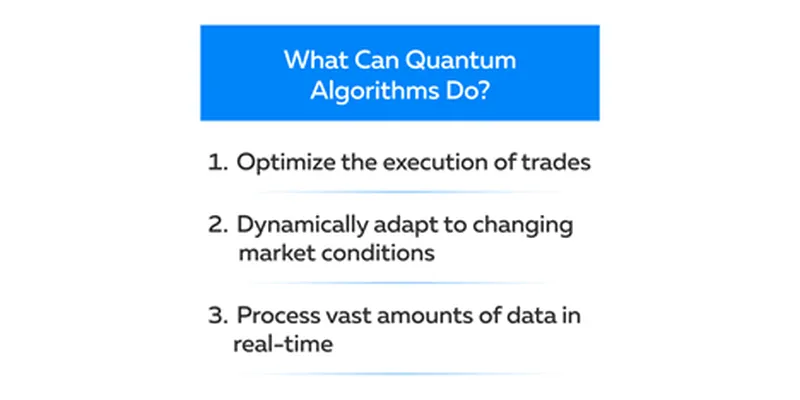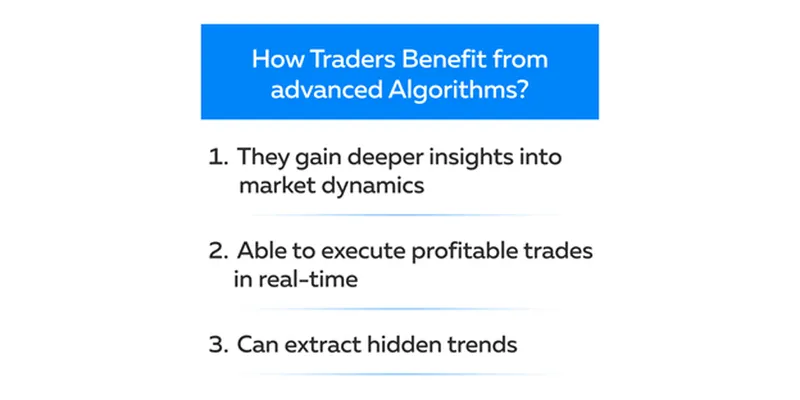
Our 4th of July Sale is Live
Offer Valid July 4 – July 11
Get 50% off Global+ AND data for 3 months—or save 30% on Global+ for the full year
Claim Your DealReady to see the market clearly?
Sign up now and make smarter trades today
Education
January 10, 2024
SHARE
Quantum Computing and the Future of Trading: What Traders Need to Know
Do you know the quantum era of trading has arrived? The world of finance is evolving and a remarkable innovation called quantum computing is gaining rapid prevalence.
This cutting-edge technology uses quantum mechanics to develop trading strategies at unprecedented speeds and perform market analysis beyond traditional boundaries.
In this article, we’ll explore quantum mechanics and understand how qubits, superposition, and entanglement revolutionize the way financial markets operate. Additionally, we’ll discuss the implications of quantum computing on encryption and financial data security. Let’s get started.
An Overview of Quantum Computing
Quantum computing is an innovative technology that can perform data operations that are infeasible for classical computers. It solves complex problems at high speeds by using features of:
- Qubits
- Superposition, and
- Entanglement
Let’s understand each of them using simpler terms.
What is Quantum Computing?
Quantum computing uses principles of quantum mechanics to revolutionize computation by using “qubits”, which are fundamental units of quantum information. Qubits are different from classical bits, which can only be in a state of 0 or 1. These can exist in multiple states simultaneously due to a phenomenon known as superposition.
Qubits
- Qubits are the building blocks of quantum information.
- They utilize quantum states, which enable quantum computers to perform complex calculations by processing an extensive range of possibilities simultaneously.
Superposition
- Superposition is a foundational principle of quantum mechanics.
- It allows quantum systems to exist in multiple states at the same time.
- In the realm of quantum computing, this means that a qubit can represent both 0 and 1 concurrently.
- This concurrent representation allows quantum computers to:
- Explore and process numerous potential solutions in parallel
- Exponentially increases their computational capacity compared to classical computers.
Quantum Entanglement
- Quantum entanglement is a phenomenon where the state of one qubit is dependent on the state of another, regardless of the physical distance between them.
- This entanglement enables quantum computers to achieve unprecedented speeds in information processing.
- Changes in the state of one entangled qubit instantaneously affect its entangled partner.
- This relationship facilitates rapid and efficient communication.
The Impact on Trading Technology
Quantum computing brings forth a seismic shift in trading technology, particularly in the field of market data analysis. The immense processing power of quantum computers can revolutionize the way financial markets operate. Here’s how it can happen:
| What Quantum Computing Can Do? | How Can It Benefit Traders? |
| Quantum computers can analyze market data, historical trends, and real-time information at unprecedented speed. | Traders gain a significant advantage in making split-second decisions. |
| With quantum computing, intricate algorithmic strategies, such as optimization of portfolio management or risk assessment, can be executed in real-time. | Traders can make more informed and strategic decisions. |
Quantum algorithms can explore several potential market scenarios concurrently which leads to more:
|
Traders can anticipate market trends, identify profitable opportunities, and mitigate risks before they escalate. |
Quantum Computing in Market Analysis
Quantum computing can revolutionize market analysis through:
- Unprecedented speeds in data processing and
- Enhancing the accuracy of predictive models in finance
Moreover, this technology can process complex datasets and consider multiple variables simultaneously, positioning quantum computing as a potent tool for gaining deeper insights into global market trends. Let’s delve deeper.
Enhancing Data Analysis
Quantum computing can analyze vast datasets, such as global market trends, at speeds inconceivable with classical computing methods. Quantum computers use superposition and entanglement to process an immense number of possibilities simultaneously.
In the context of market analysis, quantum algorithms can:
- Swiftly navigate through massive datasets
- Identify subtle patterns and correlations that might go unnoticed by classical methods
Furthermore, one of the key strengths of quantum computing lies in its capacity to enhance predictive modeling in finance. Quantum computers excel in handling the nonlinear and complex relationships widely prevalent in financial markets.
By using the principles of superposition, quantum algorithms can explore a multitude of potential market scenarios simultaneously. This broader consideration of variables leads to more accurate forecasts of market movements.
Quantum Computing in Algorithmic Trading
Quantum computing has the potential to significantly advance algorithmic trading by:
- Refining existing strategies
- Introducing novel approaches, and
- Addressing the complexities of global financial markets
Traders who adopt quantum computing early can gain a substantial edge in highly competitive algorithmic trading. Let’s explore further.
Advancing Trading Algorithms
Quantum computing can refine existing strategies by introducing entirely new, more complex approaches. The high-speed and superior parallel processing capabilities of quantum computers can significantly enhance the efficiency and effectiveness of algorithmic trading systems.

What Do Traders Gain?
Traders using quantum algorithms can:
- Use more sophisticated risk management strategies
- Risk optimize their portfolios
- Effortlessly identify subtle trading patterns
- Benefit from faster decision-making processes, and
- Improve accuracy in executing trades
Addressing Algorithmic Complexities
The global financial markets are complex and closely interconnected. This sort of association poses significant challenges for traditional algorithmic trading systems. Quantum computing has the potential to address these complexities by:
- Efficiently handling intricate relationships and
- Processing vast amounts of interrelated data.
Using quantum computing, traders can develop algorithms in real-time that adapt to:
- Changing global economic conditions
- Geopolitical events, and
- Market sentiments
How Early Adoption Can Help
Traders using quantum computing early can gain a substantial edge over their competitors. Early adopters can:
- Refine their algorithms and benefit from the unique capabilities of quantum computing. This refinement helps in:
- Outperforming traditional strategies and
- Gaining a competitive advantage in capturing market opportunities.
- Reduce latency in executing trades as quantum computers process information at high speeds. This allows faster response times to market changes.
Quantum Computing and Data Security
The advent of quantum computing necessitates a paradigm shift in encryption methods. Quantum computers possess vulnerabilities. Thus, efforts must be made to:
- Develop and implement quantum-resistant encryption techniques to safeguard financial data and
- Ensure the security of transactions and sensitive information in the quantum era.
Revolutionizing Encryption
Quantum computing poses a threat to many of today’s encryption methods, especially those which rely on mathematical problems. These encryption methods are hard for classical computers to solve but become easy for quantum computers.
Classical encryption, such as RSA (Rivest-Shamir-Adleman) and ECC (Elliptic Curve Cryptography), relies on the difficulty of:
- Factoring large numbers or
- Solving discrete logarithm problems.
Quantum computers use algorithms like Shor’s algorithm and have the potential to speed up these computations exponentially. This capability renders conventional encryption vulnerable to rapid decryption.
Why Quantum-Resistant Encryption Is Urgently Needed
The impact of quantum computing on financial data security cannot be overstated. As quantum computers get better, there’s a growing risk that bad actors might use them to break into and steal encrypted financial information. Thus, to counter this threat, it is necessary to develop and implement quantum-resistant encryption techniques that are designed to withstand attacks from quantum computers.
These techniques use the principles of quantum mechanics and create cryptographic algorithms. These sophisticated algorithms remain secure even in the face of quantum computing capabilities.
How Financial Data Security Gets Impacted
The trading world relies on secure and confidential financial data. The advent of quantum computing puts this data at security risk. It can compromise traditional encryption methods and expose sensitive information such as:
- Trading strategies
- Financial transactions, and
- Market analyses
This makes implementing robust post-quantum cryptographic protocols a proactive measure to:
- Safeguard sensitive financial data and
- Maintain trust in the security of trading operations.
Moving Towards Quantum-Resistant Solutions
The financial sector must actively collaborate with cryptography experts and researchers to develop and deploy quantum-resistant encryption solutions. This involves a strategic transition to cryptographic algorithms that are:
- Resilient to quantum attacks
- Backward compatible with existing systems.
Adapting to Quantum Advances in Trading
The importance of adapting to quantum advances in trading cannot be overstated. Traders must stay informed by:
- Reading reputable publications
- Engaging in ongoing learning, and
- Fostering collaboration with experts
Let’s understand this concept further.
Educational Imperative
Quantum computers have the potential to disrupt traditional trading strategies. This makes staying informed about developments in quantum computing crucial, especially for those involved in financial markets and trading. Traders well-versed in the capabilities and limitations of quantum computing will be better positioned to adapt and capitalize on the opportunities it presents.
How to Stay Informed
Traders must follow reputable technology publications that regularly cover advancements in quantum computing. Publications like Wired, MIT Technology Review, and Nature provide in-depth insights, analyses, and reports on the latest research and developments in the field.
Preparing Trading Strategies
Owing to the rapid acceptance of quantum computing, traders must proactively consider how it can alter market dynamics. It must be noted that the two key aspects which can undergo significant transformations are:
- Speed of transactions and
- The complexity of market analysis
Let’s understand them individually:
- Transaction Speed:
-
-
- Quantum computers can drastically accelerate transaction speeds by processing vast amounts of data simultaneously.
- Traders should be ready for a big change where trades happen quickly.
- To adapt, traders must:
- Reassess existing strategies and
- Explore how quicker transactions might impact market liquidity and price volatility.
-
- Complexity of Market Analysis:
-
- Quantum computing’s ability to deal with complicated data sets can completely change how we analyze markets.
- Traders should prepare for a shift in the depth and speed of data analysis by:
- Revisiting algorithmic trading strategies
- Exploring new indicators, and
- Adapting risk management models
How to Gradually Integrate Quantum Computing
Read the table below for a step-by-step guide on the gradual integration of quantum computing into trading strategies:
| Steps | Explanation |
| Simulate Faster Data Analysis |
|
| Education and Training |
|
| Collaboration with Quantum Experts |
|
| Pilot Projects and Prototypes |
|
Conclusion
Quantum computing can redefine trading strategies by processing vast datasets at unparalleled speeds. Traders must actively engage with this emerging technology and recognize its potential to accelerate transaction speeds, enhance predictive modeling, and address the complexities of global financial markets.
By gradually integrating this revolutionary technology into trading strategies, traders can quickly anticipate changes in market dynamics and spot emerging trends.
As you explore the cutting-edge world of quantum computing and its potential impact on trading, it’s crucial to have a solid foundation in advanced trading techniques. Enhance your understanding of complex trading strategies with our ‘Complete Guide to Algorithmic Trading.’ This guide will help you bridge your knowledge from today’s trading algorithms to the future possibilities with quantum computing. Deepen Your Algorithmic Trading Knowledge.

